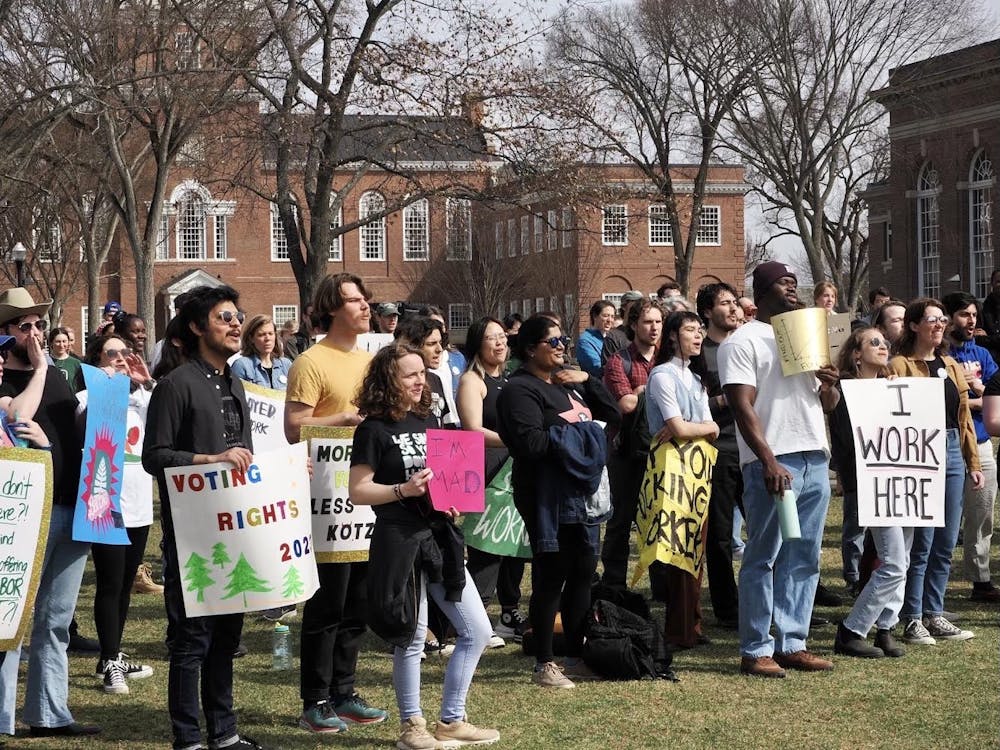Though Brown’s Graduate Labor Organization voted for unionization in 2018 and has had a collective bargaining agreement with the University since 2020, a number of organizations at Brown’s peer institutions have only just begun the unionization process.
Graduate student labor movements have progressed nationwide as students advocate for higher wages and stipends, better and more accessible working conditions, support for international graduate students and broader healthcare coverage.
While many of these organizations have been advocating for grad students for years, they are now looking to formalize their roles through official recognition from their universities and the National Labor Relations Board.
Since the start of 2023, graduate students from Dartmouth, Johns Hopkins University, the University of Chicago, Northwestern University and the University of Southern California have voted to unionize.
Formal unionization is pending on other campuses. Duke University’s labor organization filed to hold an election with the NLRB early last month. A majority of Princeton graduate students signed union cards with Princeton Graduate Students United this February, and the Stanford Graduate Workers Union launched its unionization campaign April 3.
Why unionize?
Many of the unions’ demands center around creating safer working conditions and increasing access to health care, particularly in light of the COVID-19 pandemic.
Teachers and Researchers United at Johns Hopkins University began organizing for labor rights in 2015 around “issues related to health insurance,” said Emily Hoppe, a TRU JHU organizer. The union gained traction in 2020 due to COVID-19, she added.
“There were a lot of serious concerns about graduate workers being called back in as essential workers and not feeling that they were being given adequate protection,” Hoppe said. “That reenergized things and really got the ball rolling.”
Similarly, while Northwestern University Graduate Workers formed in 2016, the pandemic “really brought to light a lot of issues that grad workers face,” said Kavi Chintam, a co-chair of and organizer for NUGW. “That helped STEM workers in particular really see how we were being exploited, because we were forced to go into labs earlier than a lot of people wanted to.”
Northwestern graduate student workers voted to unionize in January.
USC’s response to the pandemic brought its Graduate Student Worker Organizing Committee to the same conclusion. “It made people think, ‘I do need a way to protect myself because the university is not looking out for me,’” said GSWOC organizer Yonatan Hirshberg.
The pandemic also prompted Dartmouth grad students to form Graduated Organized Laborers of Dartmouth in the fall of 2021.
“Our pay wasn’t increasing to meet the cost of living here, and grad students were acting first out of desperation, but then out of a great hope for the future,” said GOLD organizer Logan Mann.
Graduate student workers at Brown have detailed similar challenges of soaring rent prices and poor housing conditions.
Union certification and challenges
To become officially recognized by the NLRB, unions must either receive voluntary recognition from their employers or conduct an election. To begin the election process, 30% of workers need to sign union cards saying they want a union.
After holding a card drive and gathering support from “well over 1,300” students, the Duke Graduate Student Union requested voluntary recognition from Duke in February, DGSU organizer Matthew Reale-Hatem said. DGSU did not receive a reply and later filed for an election with the NLRB.
In response, Duke is pursuing a legal challenge to a 2016 NLRB decision that ruled that graduate students who work as teaching and research assistants are considered university employees and thus able to unionize. “PhD students are not admitted to do a job; they are selected because of their potential to be exceptional scholars,” representatives of Duke wrote in a statement challenging the decision.
“Duke is not only refusing to work with us and refusing to respect our right to an election, but they're actually trying to relitigate the status of (all) graduate workers,” Reale-Hatem said. “It is a transparent delay tactic, but it's also a very dangerous one.”
Duke did not directly respond to requests for comment, instead referring to previous written statements.
“We’re really still hoping for an election this semester,” Reale-Hatem said. But Duke is “claiming that they don’t have space to hold an election during the rest of the semester, which is pretty absurd.”
According to Callahan, GOLD also encountered resistance from Dartmouth in its organizing efforts.
A week before GOLD’s election, Dartmouth announced it would challenge over half of expected ballots because it does not consider many of the graduate students at Dartmouth to be employees. Dartmouth sent out communications to around 800 grad students encouraging them to vote, despite expecting to challenge many of the students’ ballots, according to Callahan.
In response, GOLD organizers attempted to get the students whose ballots would be challenged “to not vote of their own accord, to boycott the polls and to go to a rally” instead, Callahan said.
“We had just a phenomenal result because people stuck to the plan. … We only got 13 votes under challenge,” Mann said. Dartmouth graduate student workers voted to unionize April 11 and 12 with a 261-33 majority.
That “demonstrated to us that people trust us and they don't trust Dartmouth,” Callahan said.
The controversy surrounding the election “signaled to us that Dartmouth is willing to use legal dirty tricks to delay this process,” Callahan said. “They are not interested in good faith bargaining.”
Dartmouth did not respond to multiple requests for comment about the election. According to the Office of the Provost’s website, “Dartmouth respects the right of all eligible students to decide for themselves whether they wish to be represented by GOLD-UE.”
“We look forward to working with GOLD-UE and the National Labor Relations Board on the next steps,” Jon Kull, dean of the Guarini School of Graduate and Advanced Studies, wrote in a statement published the day after the election results were announced.
Stanford has been “even-keeled” in its response to organizers’ April 3 unionization announcement, SGWU organizer Jason Beckman said, though they claimed the university put out a message asking faculty not to talk about the union. “That obviously ruffled some feathers (and) had some vocal professors asking, ‘why can't we talk about the union? We’re supposed to have robust debate here and listen (to) solutions,’” he said.
“We recognize and greatly value the many contributions that graduate students make to Stanford’s mission of teaching and research,” wrote Stanford President Marc Tessier-Lavigne and Provost Persis Drell in a statement issued after the union campaign was announced. “Stanford’s relationship with our graduate students is, first and foremost, an educational one.”
TRU-JHU, on the other hand, faced no difficulties working with Johns Hopkins administrators, Hoppe said. Senior administrators at Johns Hopkins expressed a similar sentiment in a letter published in February.
After Northwestern graduate students voted in favor of the election earlier this year, the university released a statement emphasizing that “Northwestern deeply values the contributions that graduate students make to its research and teaching missions.”
Negotiations
After certification, each graduate union begins negotiations with its university over its contract. GLO is currently in negotiations for its expiring contract with Brown, The Herald previously reported.
Following its recent election, Northwestern's graduate union is “now in a stage where we're about to bargain for our first contract,” Chintam said.
GSWOC had its first contract negotiations with USC April 11 to set ground rules for the rest of the discussions, which will be open to all members of the bargaining unit, according to Hirshberg.
Hirshberg said that GSWOC hopes to come to a “tentative agreement” by the end of the summer but is prepared to “escalate and put more pressure on the university to come to a fair contract” if necessary.
“USC is proud of the substantial support and competitive benefits it provides its graduate students. … We remain committed to bargaining in good faith to reach a fair contract,” wrote USC Vice President for Strategic and Crisis Communications Lauren Bartlett in an email to The Herald.
At Johns Hopkins, TRU-JHU is advocating for a “liveable wage” which, according to Hoppe, is roughly $40,000 per year for a single adult in Baltimore.
“Seeing our colleagues experiencing financial strain, food insecurity, housing insecurity — these are huge motivators for us,” she said.
At Stanford, “graduate students are paying upwards of 40% of their income on rent,” Beckman said. “Personally, my housing was about 45% of what I made every year.”
According to the United States Census Bureau, households that spend more than 30% of their monthly income on housing needs are considered cost burdened.
Many graduate students also emphasized a need for better protections for international workers. “There are a lot of extra legal hoops that international students have to jump through — often very expensive, time-consuming hoops that interfere with their career, like traveling back to countries to renew their visas,” Reale-Hatem said.
Mobilization
According to Hirshberg, USC’s union is preparing for bargaining by “making sure we have solid leadership and participation across every department as we go into contract negotiations.”
At Northwestern, phone banking and walkthroughs have ensured that NUGW maintains a constant presence on campus, Chintam said. The union has also utilized general body meetings, office hours, text banking and emails to reach its community.
At Stanford, SGWU has been “been listening to people, finding out what their needs are — what they need from their working conditions at Stanford and what they would need from a union,” Beckman said.
Due to public support from faculty, the City Council and state representatives, DGSU has been able to “exert a lot of public pressure on Duke,” Reale-Hatem said.
Many of the latest unionization efforts have come from unions associated with United Electrical Radio & Machine Workers of America, a union founded in 1936 which represents thousands of workers across the country. The University of Chicago, Johns Hopkins, Northwestern, Dartmouth and Stanford’s unions are all affiliated with UE.
According to Callahan, because so many unions in similar positions to Dartmouth are also affiliated with UE, “we were all formally part of the same network and could receive information from them and use the same tactics they used.”
Chintam explained that there has been significant “knowledge sharing, time sharing and community building” between NUGW and the University of Chicago’s unions in particular due to the schools’ close proximity. “During the whole election period, we showed up for each other,” Chintam said.
“It’s an absolutely wild wave to be in and it's been such a privilege to get to witness it,” Mann said. “The future is looking really, really bright for grad student workers.”

Katie Jain is a University News editor from New Jersey overseeing the graduate student life beat. She is a senior concentrating in International and Public Affairs and History.





